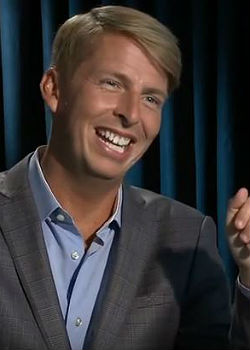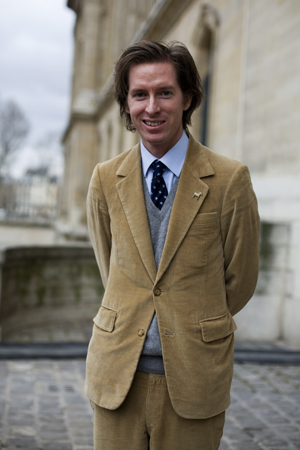 Writer/director Wes Anderson is one of my favorite filmmakers, ever since Bottle Rocket, his first film. I just dig his style – the stories about broken or unorthodox family circles, the great production design, the title cards always in the yellow Futura Bold font, the eccentric soundtracks. So, when I heard he was tackling children writer Roald Dahl’s delightful Fantastic Mr. Fox – as a stop-motion animated film about a clever Fox (George Clooney), who manages to steal from three mean farmers AND maintain a happy home life with his wife (Meryl Streep) and his son (Jason Schwartzman) – I had a feeling there would be some perfect symmetry between the two. I was correct (my review of the film to come soon).
Writer/director Wes Anderson is one of my favorite filmmakers, ever since Bottle Rocket, his first film. I just dig his style – the stories about broken or unorthodox family circles, the great production design, the title cards always in the yellow Futura Bold font, the eccentric soundtracks. So, when I heard he was tackling children writer Roald Dahl’s delightful Fantastic Mr. Fox – as a stop-motion animated film about a clever Fox (George Clooney), who manages to steal from three mean farmers AND maintain a happy home life with his wife (Meryl Streep) and his son (Jason Schwartzman) – I had a feeling there would be some perfect symmetry between the two. I was correct (my review of the film to come soon).
Needless to say, I was more than a little excited to meet the director whose films I have so admired, and, as an added bonus, got to speak with Jason Schwartzman as well, a long-time friend and frequent co-star in most of Anderson’s films. God, I loved him in Rushmore. Here’s what the guys had to say about making Fantastic Mr. Fox – and about the man who inspired them as kids: Roald Dahl.
Step 1: Love your original source material
Wes Anderson: “[Fantastic Mr. Fox] was the first book I legally owned in our household, that was my property. I still have it and it has a little book plate in there from the school fair with my name on it. But I also loved all the other ones. My older brother would read them and hand them to me when he was done … A certain point [he and co-writer Noah Baumbach] would say, ‘So, what should we put here? Oh, let’s look at the book.’ We were also trying to figure out how to expand because the book is short. There’s not that much plot in it. Sort of just enough plot for the middle of the movie, we had to think about what happens next. But we had to do it and come up with something good. And because it was adapted from [Roald Dahl’s] work, we could sort of get into character as Roald Dahl, imagine being him and ask ‘What would he do?’ That was our method.”
Jason Schwartzman: “I knew it as a little kid. My mom read to me Charlie and the Chocolate 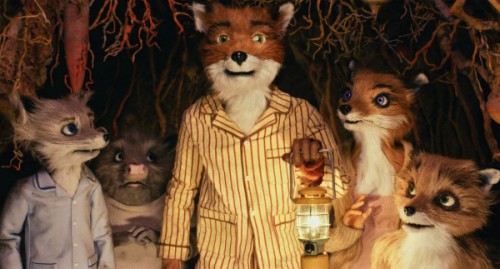 Factory and The Twits, which was my favorite one. And the movie is so scary. Have you seen the movie? Whoa. I knew [Fantastic Mr. Fox] as a kid, too. It’s crazy that I could be a part of a real piece of literature, not only literature but something that means a lot to a nation, a world. I heard he was the most beloved in all of England. The country did a poll, he’s the No. 1 most loved writer.”
Factory and The Twits, which was my favorite one. And the movie is so scary. Have you seen the movie? Whoa. I knew [Fantastic Mr. Fox] as a kid, too. It’s crazy that I could be a part of a real piece of literature, not only literature but something that means a lot to a nation, a world. I heard he was the most beloved in all of England. The country did a poll, he’s the No. 1 most loved writer.”
Step 2: If you want to get to know an author, live in his country house for a little while
Anderson: “It’s a wonderful place, that house. There’s so many details there, I’d think ‘One day I want to have THAT where I live, I want to do it like that.’ Even just simple things … for instance, the dining room table was sort of a long table with chairs. But where [Dahl] sat is unusual; it’s an armchair, with a little side table with a telephone with five lines, a notepad, all his stuff. It was like a dining room table AND his office. I really liked that. And now that’s where his wife sits, in this big chair. He was like 6’7” or something like that, big chair and she’s sort of small in the chair. But that’s where she runs the show from that spot. You really feel his personality in that place.”
Step 3: Match your own sensibilities with the material. It’s OK, Wes, it works, trust us
Anderson: “My goal was to make [Fantastic Mr. Fox] as Dahl as possible. Even though I’m American and we made all the animals American, Noah and I wrote more comfortably and thought we could be freer and hopefully funnier writing in an American way. Our own idiom or something like that worked better for us. But we fully expected to expand it the way Dahl may have done himself. And in the end, it seemed like something I would have done, but it was not deliberate. I mean, it may seem that way because I was making the decisions but not because I wanted it to feel like another thing I did. On the last movie I did [Darjeeling Limited], people said they thought it was a lot like the other movies I’ve done, but I felt like, ‘We’ve gone to India, we are on a train, it’s totally different!’ I guess it’s not something I’m able to regulate, [my style] that comes through.”
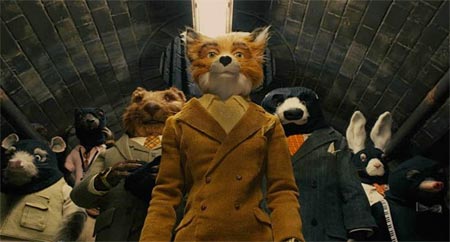 Step 4: Make that style work with a stop-motion animated film, even if it kills you
Step 4: Make that style work with a stop-motion animated film, even if it kills you
Anderson: “I have a way of thinking about staging and design and sets. Of the whole range of things you can think of, my entire range is only here [indicates a small box]. And it doesn’t go outside of that. So when something is happening over there, I find a way to make it fit over here. Working with all these talented people whose lives are dedicated to stop-motion animation and making these miniature things seem like they are alive was amazing. There are techniques they’ve learned and ways to do it that are effective, but I had my own ways that come from NOT having experience with [stop-motion animation]. And I wanted to shoot it just the same way I would a live-action movie, which in the end became extremely challenging.
“I expected to do this more like Tim Burton, write the script, design the sets, draw up the shots and then hand it over and the team of animators would animate it. I thought I would go direct another movie during that time, come back work on the score. And I realized pretty early on that wasn’t going to be possible. Which then meant for two years, it was everyday, from the moment you wake up. So if you want one long shot and not cut during it and lots of puppets animated, it’s going to take longer. But I’m happy with it, we were under budget, so we managed to figure it all out.”
Schwartzman: “People touched it. On the one hand, you know it’s not real, that it’s animated but what gives it a feeling of reality is that it’s human. Humans made this movie, no computers.”
Step 5: Forget the sound booths, do it as a radio play
Schwartzman: “Do you know we did this movie in a very unorthodox style? Let me tell you about it. We actually did most of the recording live on location. On farms, all together. That was part of Wes’ whole concept. When he brought me in on Darjeeling Limited, he only had a small kernel of an idea: three brothers on a train in India. But parallel to this was HOW he wanted to make it. No trailers for actor, no craft services. All actors do their own hair and makeup. We are going to shoot it on a real moving train in the desert and we are going to all live together in a big house. And that is what we had with [Fantastic Mr. Fox]. He had a finished script, but he also had the way in which he wanted to do it, unorthodox, getting all the actors together and doing it as a radio play. You drive by these billboards of these animated movies and they’ve got the most awesomeness cast but then you realize, ‘Aw, they never met.’ And that’s fine. I mean, the way Pixar does it, they are the Beatles of animation, and I have a lot respect for a Pixar actor who has to sit in a room by himself and having to generate an authentic performance. Even though I hadn’t done animation before, it was fun to do it in this new, fun way, really acting it out. For instance, if there was a scene outside, we all went outside. If we had to be digging in the scene, we’d all start digging in the ground. And if we were 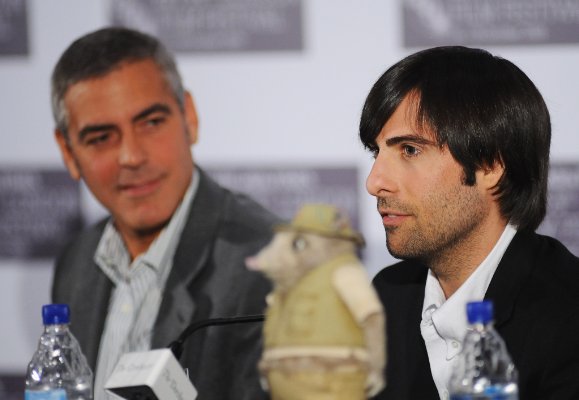 eating, we all were really eating. The sound was recorded with just one microphone. And that’s how we could get overlapping and mistakes. It’s always an adventure with Wes, now that I think about it.”
eating, we all were really eating. The sound was recorded with just one microphone. And that’s how we could get overlapping and mistakes. It’s always an adventure with Wes, now that I think about it.”
Step 6: Realize it’s not that bad to dig in the dirt with George Clooney
Schwartzman: “It’s surreal. When you watch this, you just realize what an incredible voice he has. Because we were doing this all together, there would be scenes I wasn’t in, so I’d sit there with Wes and George and Bill [Murray] and watch. I’d close my eyes, sitting close to George Clooney, listening to his voice. I know it sounds funny, but fuck, he’s got such an incredible voice – nooks and scratches and cuts on that voice. Pretty amazing.”
Step 7: Don’t underestimate kids
Schwartzman: “I know there are brilliant people who work at the studios whose job it is to dissect society and ask people questions, do polls and all kinds of stuff. So obviously, they do know something, but … I will say a couple of things: First, that’s the great thing about Pixar, they smuggle in so much. You’re watching it, and I’m laughing and getting so much out of it. And then I look at the little kids around me and they are laughing, too. And I’m wondering, are they laughing because we adults are? Somehow, it’s soaking into their bodies, like other messages, death whatever. Like in Up, that’s a heavy movie in the beginning. I think little kids are little humans, they feel so much. I’m now an adult, and that’s a problem so many adults speaking about what they think kids feel. And now I’m not even in touch with kids. I remember when I was a kid, playing video games when my parents were having a dinner party and some like older person with glasses, walks in and I’d see them thigh down and they ask ‘What are ya playing?’ I’m like, ‘You don’t know, get out of here.’ And now I’m THAT dude. I was at a party, ‘So what is this thing, you can play tennis holding this thing?’ … we are just like little people with so many emotions, angry and confused. Why do kids go lock themselves in closets for hours and hide from people? Had I seen [Fantastic Mr. Fox] when I was little it would have helped me. I felt little and that girls didn’t like me back. I felt different, I totally was different. Made fun of all the time, never as good an athlete that I wanted to be. So, I totally support filmmakers for making movies that are a bit complex for kids.”


